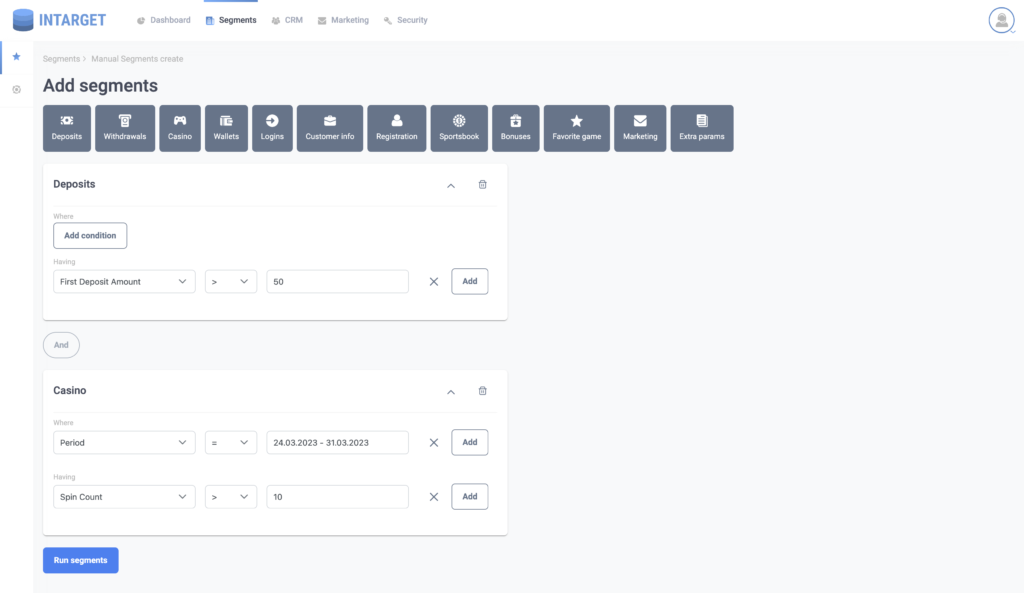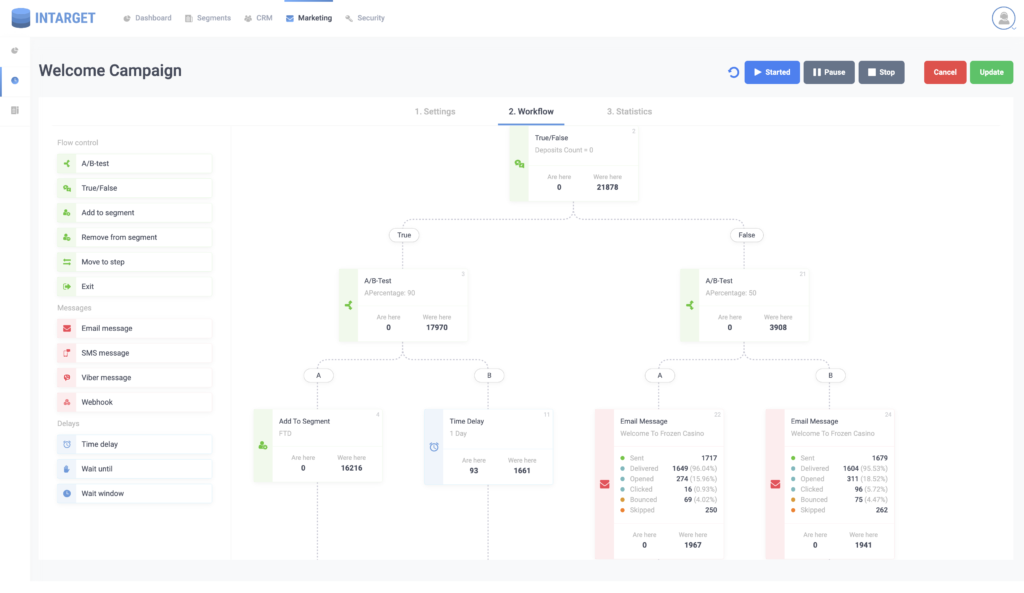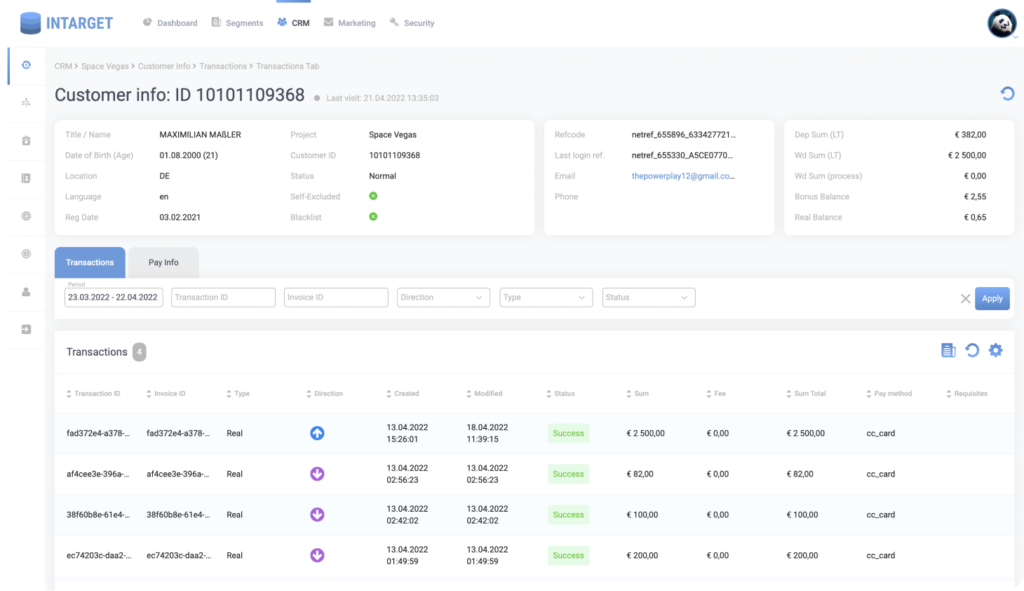In the highly competitive world of iGaming, staying ahead of the curve is crucial for success. One of the most effective tools at your disposal is a Customer Relationship Management (CRM) system. By harnessing the power of CRM, you can take your iGaming business to new heights, optimizing customer experiences, driving growth, and maximizing profitability. In this article, we will explore the role of CRM in iGaming and demonstrate how to leverage it for your business’s benefit.
Understanding the Role of CRM in iGaming
Before diving into the specifics of CRM, it’s important to grasp its fundamental significance in the iGaming industry. At its core, CRM is all about building and maintaining strong relationships with your customers. From capturing leads and managing interactions to analyzing data and personalizing experiences, CRM allows you to navigate the intricate landscape of the iGaming market.
When it comes to the iGaming industry, customer relationship management (CRM) plays a crucial role in ensuring the success of online gambling platforms. With the ever-increasing competition and the constant evolution of technology, iGaming operators need to stay ahead of the game by understanding their customers’ needs and preferences.
The Basics of CRM in iGaming
CRM provides you with a centralized platform to store and access customer information, such as communication history, preferences, and behaviors. This consolidated view empowers you to deliver personalized experiences, tailored promotions, and targeted marketing campaigns. By treating each customer as an individual, you can enhance engagement, loyalty, and ultimately, revenue.
Implementing a CRM system in the iGaming industry allows operators to gather valuable data about their customers, including their betting patterns, game preferences, and spending habits. This data can then be used to create personalized offers and promotions that are specifically tailored to each individual player.
Why CRM is Crucial for iGaming Success
In the fast-paced world of iGaming, competition is fierce. A CRM system gives you the edge by enabling you to understand your customers better than ever before. By tracking their activities and anticipating their needs, you can respond with tailored offerings, compelling incentives, and personalized interactions. This proactive approach delights customers, driving customer retention and ultimately boosting your bottom line.
With the help of CRM, iGaming operators can identify high-value players and provide them with exclusive rewards and incentives to keep them engaged and loyal. By understanding their preferences and behaviors, operators can also offer personalized recommendations for games and promotions, increasing the chances of conversion and customer satisfaction.
Moreover, CRM allows iGaming operators to segment their customer base and target specific groups with relevant marketing campaigns. By analyzing the data collected through the CRM system, operators can identify trends and patterns that can be used to create targeted promotions and offers. This not only increases the effectiveness of marketing efforts but also helps in maximizing the return on investment.
In conclusion, CRM is an essential tool for success in the iGaming industry. By leveraging customer data and personalizing experiences, operators can build strong relationships with their customers, enhance engagement and loyalty, and ultimately drive revenue growth. With the ever-increasing competition in the iGaming market, implementing a robust CRM system is no longer an option but a necessity for operators looking to thrive in this dynamic industry.
Selecting the Right CRM for Your iGaming Business
Now that you understand the importance of CRM in iGaming, it’s time to explore how to select the right CRM system for your business. With numerous vendors in the market, finding the perfect fit can be challenging. However, by focusing on key features and evaluating providers, you can make an informed decision that aligns with your business objectives.
When it comes to selecting a CRM for your iGaming business, there are several key features that you should look for. One of the most important features is advanced segmentation. This allows you to divide your customer base into different groups based on various criteria, such as their playing preferences, spending habits, or geographic location. By segmenting your customers, you can tailor your marketing efforts and provide personalized experiences, ultimately increasing customer satisfaction and loyalty.
In addition to advanced segmentation, marketing automation is another crucial feature to consider. With marketing automation, you can automate repetitive tasks, such as sending personalized emails or SMS notifications, based on predefined triggers. This not only saves you time and resources but also ensures that your customers receive timely and relevant communications, enhancing their overall experience with your iGaming business.
Real-time analytics is another feature that should not be overlooked. By having access to real-time data and analytics, you can gain valuable insights into your customers’ behavior, preferences, and engagement patterns. This information can help you make data-driven decisions, optimize your marketing strategies, and identify areas for improvement. It’s essential to choose a CRM system that provides robust reporting and analytics capabilities to empower you with actionable insights.
Furthermore, seamless integration with your existing systems is crucial for a smooth and efficient operation. Look for a CRM solution that can seamlessly integrate with your iGaming platform, payment gateways, customer support tools, and other relevant systems. This integration will enable data synchronization and ensure a seamless flow of information across different platforms, eliminating manual data entry and reducing the risk of errors.
Evaluating CRM Providers for iGaming
Not all CRM providers are created equal. It’s important to evaluate potential vendors based on their industry experience, reputation, and track record. Look for providers with expertise in the iGaming sector who can understand the unique challenges and requirements of your business.
When evaluating CRM providers, consider their scalability. As your iGaming business grows, you need a CRM system that can scale with your needs. Ensure that the CRM provider has the capability to handle increasing data volumes, user traffic, and customer interactions without compromising performance or user experience.
Another factor to consider is ease of use. A CRM system should be intuitive and user-friendly, enabling your team to quickly adapt and utilize its full potential. Look for a provider that offers comprehensive training and ongoing support to ensure a smooth transition and maximize the value of your CRM investment.
Lastly, consider the level of ongoing support provided by the CRM provider. A reliable and responsive support team is essential in case of any technical issues or questions that may arise. Look for a provider that offers 24/7 support, multiple communication channels, and a dedicated account manager to ensure that you receive timely assistance whenever you need it.
In conclusion, selecting the right CRM system for your iGaming business requires careful consideration of key features and evaluating CRM providers. By choosing a CRM solution with advanced segmentation, marketing automation, real-time analytics, and seamless integration, you can streamline operations, enhance customer engagement, and gain actionable insights. Additionally, partnering with a CRM provider with industry expertise, scalability, ease of use, and ongoing support will set your iGaming business up for long-term success.
Implementing CRM in Your iGaming Operations
Once you’ve selected the ideal CRM system for your iGaming business, the next step is implementing it effectively. Successful CRM implementation requires careful planning and execution to overcome potential challenges and maximize the benefits it brings to your operations.
Implementing a CRM system in your iGaming operations can significantly enhance your business processes and customer relationships. By effectively utilizing a CRM system, you can streamline your operations, improve customer satisfaction, and drive revenue growth.
Steps to Successful CRM Implementation
Start by clearly defining your objectives and identifying the key stakeholders involved. This will ensure that everyone is on the same page and working towards a common goal. Mapping out your customer journey is also crucial in understanding how CRM can enhance each touchpoint. By identifying pain points and areas for improvement, you can tailor your CRM strategy to address these specific needs.
Customizing the CRM system to align with your business processes is essential for a seamless transition. This involves configuring the system to match your unique workflows, data fields, and reporting requirements. Additionally, integrating the CRM system with your existing platforms, such as your iGaming platform or customer support software, will further enhance its functionality and provide a holistic view of your operations.
Training your team on how to harness the CRM’s capabilities is vital for successful implementation. Ensure that your employees understand the benefits of using the CRM system and provide comprehensive training sessions to familiarize them with its features and functionalities. Ongoing support and guidance are also crucial to encourage adoption and ensure that your team maximizes the system’s potential.
Regularly reviewing and optimizing your CRM strategy is essential for continuous improvement. Analyze the data and insights provided by the CRM system to identify areas for enhancement. By leveraging the system’s reporting and analytics capabilities, you can make data-driven decisions and refine your CRM strategy to better serve your customers and drive business growth.
Overcoming Common CRM Implementation Challenges
Implementing CRM in iGaming operations can present unique challenges. Resistance to change is a common roadblock that needs to be addressed. Some employees may be hesitant to adopt new technologies or change their established workflows. To overcome this challenge, it is crucial to foster a culture of openness and provide clear communication about the benefits of the CRM system. Involve your team in the decision-making process and address any concerns or misconceptions they may have.
Data migration complexities can also pose challenges during CRM implementation. Migrating data from existing systems to the new CRM system requires careful planning and execution to ensure data integrity and accuracy. It is essential to thoroughly assess your data migration needs and work closely with your IT team or CRM vendor to develop a robust migration plan.
Cultural hurdles, such as resistance to sharing customer data or a lack of understanding of the CRM system’s value, can hinder successful implementation. To overcome these challenges, provide comprehensive training and support to your team. Emphasize the importance of data-driven decision-making and the benefits of having a centralized system to manage customer interactions. By addressing cultural barriers and educating your team, you can foster a positive environment for CRM adoption.
Implementing a CRM system in your iGaming operations is a strategic investment that can yield significant benefits. By carefully planning and executing the implementation process, addressing common challenges, and continuously optimizing your CRM strategy, you can maximize the value of your CRM system and drive success in your iGaming business.
Optimizing CRM for iGaming Growth
Once your CRM system is up and running, it’s essential to harness its full potential to drive sustainable growth for your iGaming business. By leveraging CRM for customer retention and effective marketing strategies, you can cultivate a loyal customer base and achieve long-term success.
Leveraging CRM for Customer Retention
CRM plays a critical role in building and maintaining strong customer relationships, which directly contributes to retention rates. By segmenting your customer base based on behavior, preferences, and spend patterns, you can create targeted retention campaigns, personalized bonuses, and tailored loyalty programs. This level of personalization allows you to provide customers with offers and rewards that align with their interests and preferences, increasing their satisfaction and likelihood of staying with your iGaming platform.
Furthermore, CRM enables you to track and analyze customer interactions, allowing you to identify potential churn risks. By proactively addressing these risks, such as reaching out to customers who have shown signs of disengagement, you can take preventive measures to retain them. Additionally, CRM provides valuable insights into customer feedback and sentiment, helping you understand their needs and expectations better. Armed with this information, you can continuously improve your services and address any pain points, further enhancing customer retention.
Using CRM for Effective Marketing Strategies
CRM empowers you to execute data-driven marketing strategies that yield results. By utilizing real-time analytics and customer insights, you gain visibility into campaign performance and customer behavior. This valuable data allows you to optimize your marketing efforts and make informed decisions that resonate with your target audience.
One effective way to leverage CRM for marketing is by implementing personalized email campaigns. By utilizing customer data, such as their preferred game genres, betting patterns, or favorite promotions, you can create highly targeted and relevant email content. This level of personalization increases the chances of engagement and conversion, as customers receive offers that align with their interests and preferences.
Moreover, CRM allows you to track customer interactions across various channels, such as social media, website visits, and customer support interactions. By consolidating this data, you can gain a holistic view of each customer’s journey and tailor your marketing messages accordingly. For example, if a customer has recently contacted customer support with a specific issue, you can follow up with targeted content that addresses their concern and provides a solution.
Additionally, CRM enables you to identify high-value customers and implement strategies to nurture and retain them. By analyzing their spending patterns, frequency of visits, and engagement levels, you can create exclusive offers, VIP programs, or personalized incentives to reward their loyalty. This not only strengthens the relationship with these valuable customers but also encourages them to continue choosing your iGaming platform over competitors.
In conclusion, CRM is a powerful tool for optimizing iGaming growth. By leveraging CRM for customer retention and effective marketing strategies, you can create personalized experiences, foster loyalty, and drive revenue growth. Continuously analyzing customer data and adapting your strategies based on insights will ensure that your iGaming business thrives in a competitive market.
Measuring the Impact of CRM on Your iGaming Business
Finally, it’s crucial to measure the impact of your CRM system and validate its contribution to your iGaming business. By tracking key performance indicators and interpreting CRM data, you can gain actionable insights, identify areas of improvement, and make data-driven decisions to further optimize your operations.
Implementing a CRM system in your iGaming business is just the first step towards success. To truly understand its impact, you need to delve deeper into the data it provides. By analyzing the metrics that matter most to your business, you can gauge the effectiveness of your CRM strategy and make informed decisions that drive growth.
Key Performance Indicators for CRM
When measuring the impact of CRM on your business, it’s important to focus on specific metrics that align with your objectives. Some key performance indicators to consider include customer acquisition costs, customer lifetime value, retention rates, conversion rates, and ROI on marketing campaigns. By regularly reviewing these metrics and comparing them against your targets, you can evaluate the effectiveness of your CRM strategy and identify opportunities for improvement.
Customer acquisition costs are a crucial metric to track as they provide insights into the efficiency of your marketing efforts. By calculating the cost of acquiring each new customer, you can determine the return on investment for your marketing campaigns and allocate resources accordingly.
Customer lifetime value is another important metric that helps you understand the long-term value of each customer. By analyzing the revenue generated by a customer throughout their entire relationship with your business, you can identify high-value customers and tailor your marketing strategies to retain them.
Retention rates indicate how successful your CRM system is at keeping customers engaged and loyal. By measuring the percentage of customers who continue to use your iGaming platform over time, you can identify areas where improvements can be made to enhance customer satisfaction and reduce churn.
Conversion rates measure the effectiveness of your CRM system in turning leads into paying customers. By tracking the percentage of leads that convert into actual sales, you can identify bottlenecks in your sales funnel and optimize your customer journey to improve conversion rates.
ROI on marketing campaigns is a critical metric that helps you understand the profitability of your marketing efforts. By measuring the return on investment for each marketing campaign, you can identify which strategies are most effective and allocate your marketing budget accordingly.
Interpreting CRM Data for Business Insights
The data generated by your CRM system holds valuable insights that can guide your business decisions. By analyzing customer behavior, preferences, and engagement patterns, you can identify trends, predict future outcomes, and optimize your operations. Leverage reporting tools and data visualization techniques to transform raw data into meaningful information that fuels your iGaming business’s growth.
Customer behavior analysis allows you to understand how customers interact with your iGaming platform. By examining their browsing habits, game preferences, and frequency of play, you can tailor your offerings to meet their needs and enhance their overall experience.
Customer preferences provide valuable information on what features, games, or promotions resonate most with your target audience. By analyzing this data, you can personalize your marketing campaigns and promotions to increase customer engagement and loyalty.
Engagement patterns reveal how customers interact with your iGaming platform over time. By studying their activity levels, session durations, and frequency of deposits, you can identify patterns that indicate potential churn or opportunities for upselling and cross-selling.
Reporting tools and data visualization techniques are essential for transforming raw CRM data into actionable insights. By presenting data in visually appealing and easy-to-understand formats, you can effectively communicate key findings to stakeholders and make data-driven decisions that drive your iGaming business’s growth.
Conclusion
In conclusion, maximizing your iGaming business with a CRM system is essential in today’s competitive landscape. By understanding the role of CRM, selecting the right system, implementing it effectively, and optimizing it for growth, you can unlock the true potential of your iGaming business. Embrace CRM as a strategic tool and leverage its capabilities to elevate customer experiences, drive growth, and ultimately achieve iGaming success.


